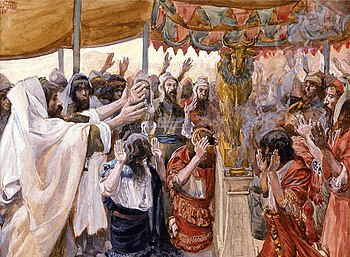Bonjour / Hello [nickname_else_first_name],
Table of contents
1) Perashat Hashavoua - Rabbi Eli Mansour
2) Halakhat Hashavoua (Halakhot related to day to day life) By Hazzan David Azerad -
Shabbat and the Jewish People - Peninei Halacha
3) Holy Jokes!
4) For KIDS

This Week's Parasha Insight with Rabbi Eli Mansour
Parashat Ekeb- Defending Am Yisrael
In Parashat Ekeb, Moshe Rabbenu recalls how after he spent forty days in the heavens receiving the Torah, he came down and saw the people worshipping the golden calf. He then later returned to the heavens to plead that G-d forgive Am Yisrael for their sin.
The work Amudeha Shiba brings an obscure Midrashic passage that connects Moshe’s pleas to G-d after the sin of the golden with the story of Eliyahu Ha’nabi. As we read in the Book of Melachim I (chapter 19), Eliyahu was forced to flee from Izebel, the queen of Israel who sought to kill him, and he came to Sinai. There he was provided with some food, which, the verse states, sustained him for forty days and forty nights. G-d then appeared to Eliyahu, and he reported to G-d that Am Yisrael had abandoned His covenant and worshipped idols. The Midrash interprets these verses to mean that after Eliyahu ate, he was shown a vision of Moshe Rabbenu spending forty days and forty nights atop Mount Sinai pleading with G-d for forgiveness on behalf of the Jewish People. G-d sharply chastised Eliyahu for reporting negatively to G-d about Am Yisrael, instead of advocating on their behalf, as Moshe had done.
To explain this Midrash, the Amudeha Shiba cites a famous passage in a different Midrashic source which teaches that when G-d wanted to create Adam, various groups of angels protested. One such group was the group which represented "Emet" (truth), and who argued that human beings should not be created, because they are dishonest. To silence their protest, the Midrash relates, G-d took hold of "Emet" and "threw them to the ground." One commentator (the "Zera Berech") explains this to mean that he sent the angels of this group down to earth, where they would derive benefit from human beings and thus come to appreciate the greatness of people, instead of objecting to their having been created. One of these angels was Eliyahu Ha’nabi. He was originally an angel, part of the "Emet" group, and he was sent to earth for the purpose of being shown the positive qualities of human beings.
This group of angels also consisted of the three angels who visited Abraham Abinu, who served them a lavish meal. They, too, had argued against the creation of man, and so they were sent to earth where they would benefit from the hospitality of a human being, and thus appreciate them. The effects of these angels’ visit to Abraham were felt years later, when Moshe went to the heavens to receive the Torah. The Midrash relates that the angels initially protested, arguing that the Torah belongs in the sublime, pure domain of the heavens, and should not be entrusted to frail human beings. G-d responded by making Moshe Rabbenu appear like Abraham Abinu, and then reminding the angels of how they were once fed and cared for by a human being. They were sent to the world to see the greatness of human beings, and acknowledge the value of their being created and that they deserved G-d’s Torah. And because of this experience, they were compelled to stop protesting the decision to give Beneh Yisrael the Torah.
With this background, the Amudeha Shiba proceeds to suggest a novel reading of the Midrash’s interpretation of the story of Eliyahu. He explained that Eliyahu did not actually survive for forty days from the nourishment provided by the small morsel of food he was given. This description actually refers to Moshe Rabbenu. G-d showed Eliyahu a vision of Moshe’s forty-day stay in the heavens which was "sustained" by the eating of the three angels who visited Abraham. Moshe was able to receive the Torah because years earlier, G-d had sent three angels to Abraham’s tent, where they were fed, proving to them the greatness of the human being, and why the Jewish People deserved to receive the Torah. Eliyahu, too, was sent to this world to receive benefit from people and recognize their greatness – but he did not learn the lesson. Instead of defending and advocating for the Jewish Nation, he instead complained about them to the Almighty.
The role of a Jewish leader – and, in a sense, of each one of us – is to advocate for the people, not to complain about them. Of course, at the appropriate time and in the appropriate manner, a leader is required to point out to the people their mistakes so they will improve. But in speaking to G-d, the leader’s obligation is to pray on the people’s behalf, to emphasize only their virtues, their merits, their good deeds and their good qualities. There are enough "prosecuting" angels in the heavens who argue against the Jewish Nation before the Heavenly Tribunal. They don’t need our help. Our focus must instead be directed towards all that is beautiful about the Jewish People, and pleading to G-d to bless His beloved nation and shower them all with joy, success and prosperity.

Halachot this week are selected and Translated by Hazzan David Azerad
Shabbat and the Jewish People - Peninei Halacha
The Sages ask: Why does the Torah’s description of the end of the sixth day of creation conclude with “And there was evening and there was morning, the sixth day” (Bereishit 1:31), with the definite article? They explain that the Torah alludes to the sixth of Sivan when the Torah was given to Israel. “God set a condition with Creation: ‘If Israel accepts the Torah, you will continue to exist, but if not, then I will return you to being formless and void” (Shabbat 88a). Immediately after the completion of the sixth weekday was the creation of Shabbat, the expression of God’s kingship. It is upon this sixth day that, in the future, God will give the Torah to Israel (ibid. 86b).
Until Jews appeared in the world, Shabbat was alone, with no one present to reveal its holiness and blessedness. The Sages express this as follows:
Shabbat said before: “Master of the Universe, everybody has a partner except for me. The six days of creation pair off; only I have no partner.” God replied: “The people of Israel are your partner.” When the Jews stood before Sinai, God said to them: “Remember what I told Shabbat: ‘The people of Israel are your partner.’” This is the meaning of the commandment “Commemorate the day of Shabbat to sanctify it (Shemot 20:8).” (Bereishit Rabba 11:8)
It is true that even before the Jewish people accepted the Torah, Shabbat was already sanctified and blessed, since that is when God stopped His work. Moreover, Shabbat is the heart and soul of the world. However, the blessing that Shabbat bestowed then was limited to ensuring the world’s existence. All the imperfections endemic to the world remained, without the possibility of repair. Therefore God stipulated with His world that should the Jews refuse the Torah, the world would revert to chaos. What would be the point of its existence if it, with all its pain, were to continue without the possibility of progressing and advancing toward a more perfect state?
The Sages ask: Why does the Torah’s description of the end of the sixth day of creation conclude with “And there was evening and there was morning, the sixth day” (Bereishit 1:31), with the definite article? They explain that the Torah alludes to the sixth of Sivan when the Torah was given to Israel. “God set a condition with Creation: ‘If Israel accepts the Torah, you will continue to exist, but if not, then I will return you to being formless and void” (Shabbat 88a). Immediately after the completion of the sixth weekday was the creation of Shabbat, the expression of God’s kingship. It is upon this sixth day that, in the future, God will give the Torah to Israel (ibid. 86b).
Until Jews appeared in the world, Shabbat was alone, with no one present to reveal its holiness and blessedness. The Sages express this as follows:
Shabbat said before: “Master of the Universe, everybody has a partner except for me. The six days of creation pair off; only I have no partner.” God replied: “The people of Israel are your partner.” When the Jews stood before Sinai, God said to them: “Remember what I told Shabbat: ‘The people of Israel are your partner.’” This is the meaning of the commandment “Commemorate the day of Shabbat to sanctify it (Shemot 20:8).” (Bereishit Rabba 11:8)
It is true that even before the Jewish people accepted the Torah, Shabbat was already sanctified and blessed, since that is when God stopped His work. Moreover, Shabbat is the heart and soul of the world. However, the blessing that Shabbat bestowed then was limited to ensuring the world’s existence. All the imperfections endemic to the world remained, without the possibility of repair. Therefore God stipulated with His world that should the Jews refuse the Torah, the world would revert to chaos. What would be the point of its existence if it, with all its pain, were to continue without the possibility of progressing and advancing toward a more perfect state?
Bevirkat Shabbat Shalom Umevorach
David Azerad
3) HOLY JoKeS!!
Selection of funny snippets, loosely related to this weeks parashah or current events, to brighten your day


4) FOR KIDS
Click on the image to open the youtube video
















